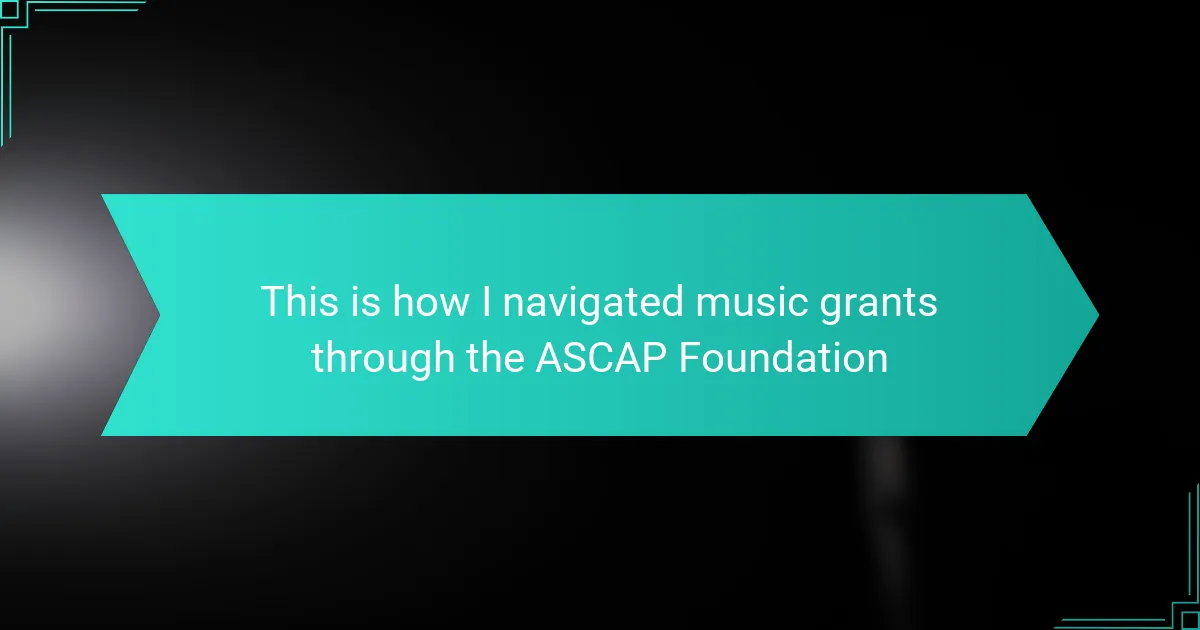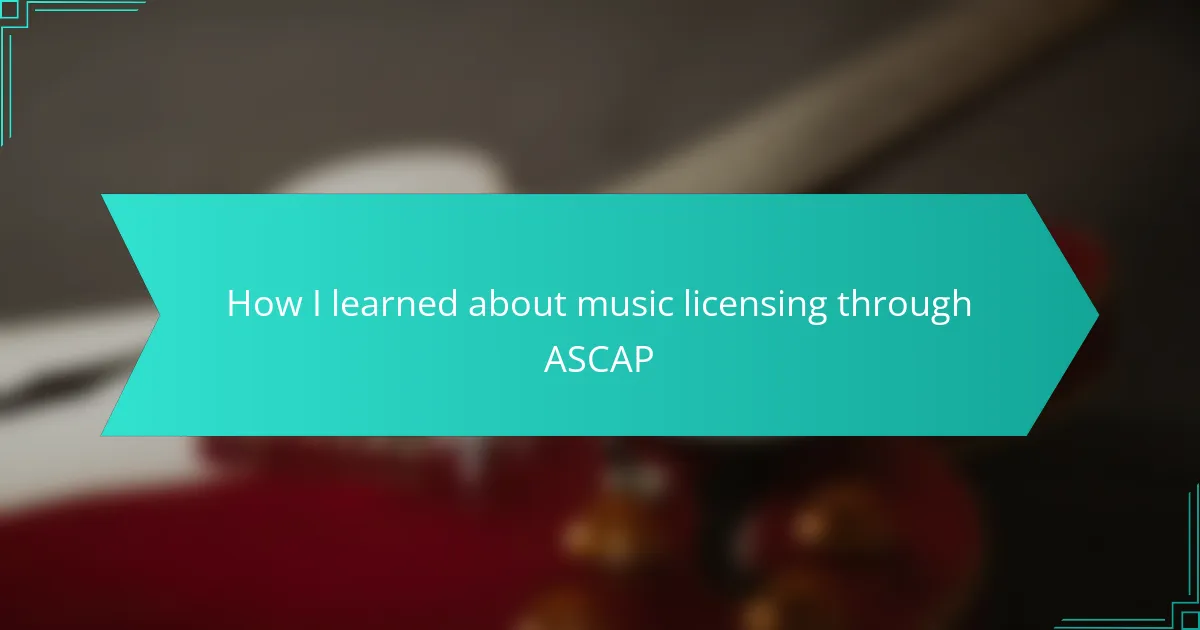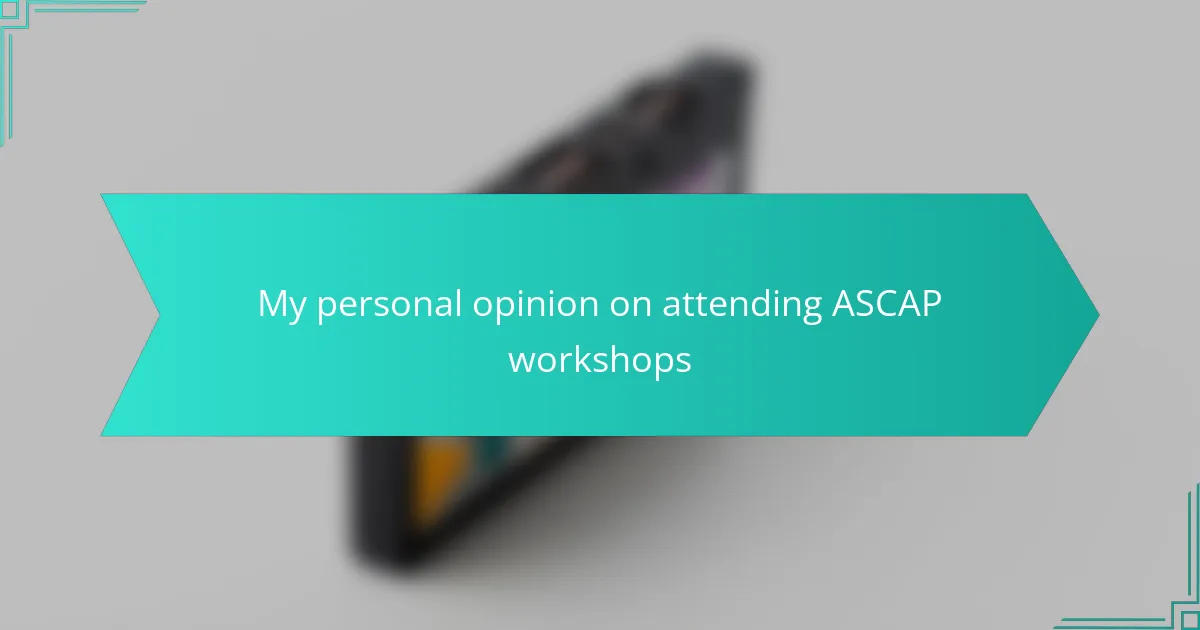Key takeaways
- Music grants provide essential financial support for artists, allowing them to focus on their creative projects.
- The ASCAP Foundation offers various grants, including Creative Music Grants, Scholarship Grants, and Career Development Grants, each serving different purposes.
- Applying for grants requires thorough research, careful preparation of materials, and seeking support from peers for better insights.
- Successful applications should be tailored to specific grant goals, showcase community impact, and include feedback from collaborators.
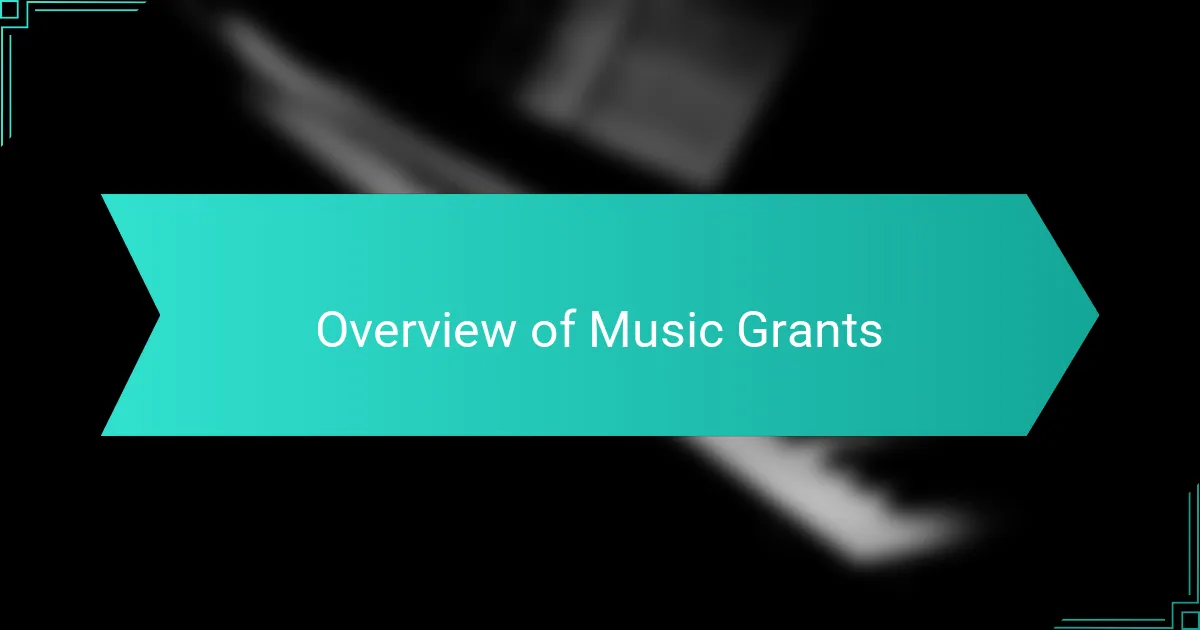
Overview of Music Grants
Music grants offer crucial financial support to artists, allowing them to focus on their craft rather than worry about funding. I remember when I first discovered these opportunities; it felt like a lifeline I didn’t know I needed. Have you ever wished for a boost to take your music to the next level? That’s how grants helped me.
Navigating the various grants can be overwhelming, with requirements and deadlines varying widely. I often found myself poring over applications, each one feeling like a new puzzle to solve. However, the satisfaction of submitting a well-crafted proposal is like no other. It makes me wonder, how many great projects might never see the light of day simply because artists don’t know where to start?
The funding can come from different sources, including foundations, government programs, and private organizations. I’ve learned that each grant can have distinct goals, often aimed at specific genres or community engagement. It’s empowering to realize that there’s financial aid out there specifically for people like us—artists chasing their dreams. Have you explored these funding avenues yet? They could be the key to unlocking your next project.
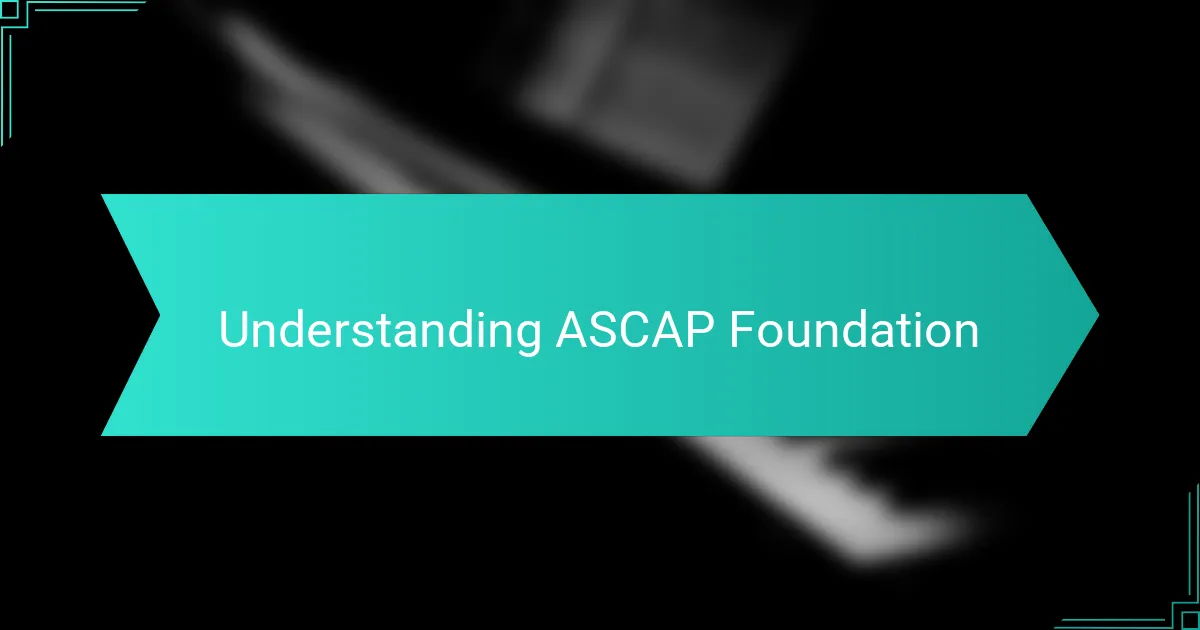
Understanding ASCAP Foundation
The ASCAP Foundation plays a vital role in supporting music creators through various grant opportunities. From my experience, I found that the Foundation not only provides financial assistance but also fosters community among artists. Navigating the application process can be daunting, but having access to resources like workshops and mentorship can make a significant difference.
One aspect I appreciated was the Foundation’s commitment to education; it really resonated with me because I believe in the importance of nurturing the next generation of musicians. Understanding the specific grants available helps tailor your application to showcase your unique artistry and needs.
| Grant Type | Purpose |
|---|---|
| Creative Music Grant | Supports new works by composers and songwriters. |
| Scholarship Grants | Aids students pursuing music education. |
| Career Development Grant | Assists emerging artists in their career progression. |
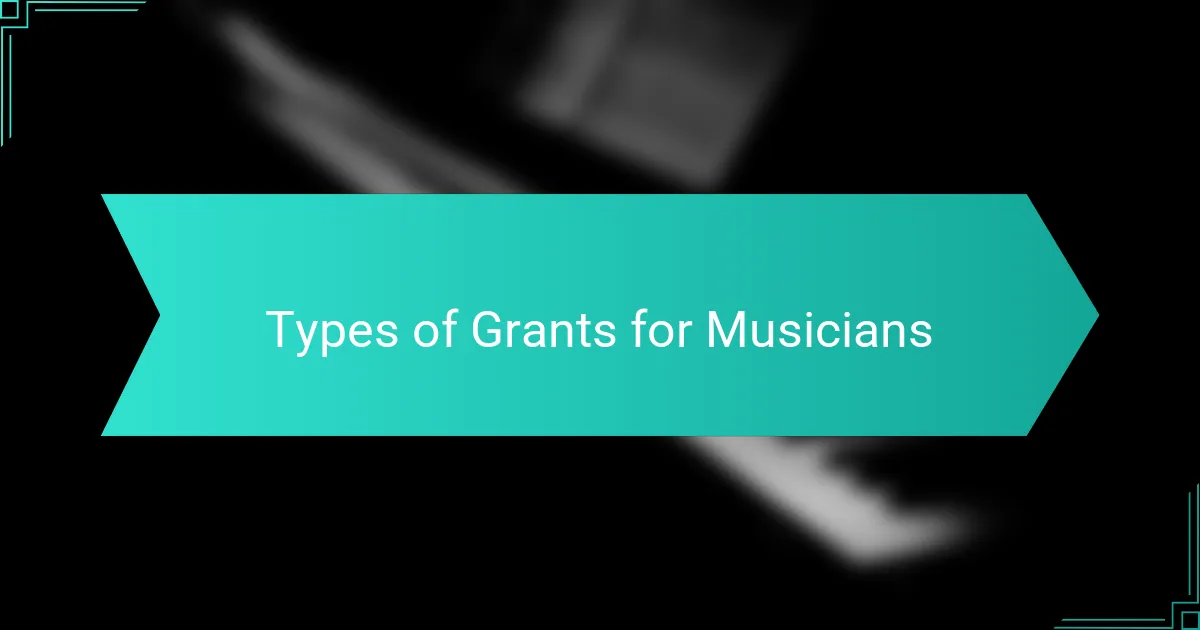
Types of Grants for Musicians
The Creative Music Grant was a game changer for me when I was composing my first album. It focuses on supporting new works, which means it’s tailored for artists like us who are in the process of discovery and innovation. Have you ever poured your heart into a piece, only to wonder how to bring it to life? This grant can help bridge that gap.
Scholarship grants specifically aim at students pursuing music education, and I wish I had known about them earlier. I remember how stressful it was to juggle finances while trying to learn my craft. Just think about it—having financial support while you’re gaining skills can make a world of difference. It’s not just about making music; it’s about building a sustainable future.
The Career Development Grant stands out for emerging artists needing assistance with their journey. Reflecting on my own early days, I can’t stress enough how vital a little support can be at this stage. Have you ever felt lost trying to figure out your next steps? This grant can provide the financial boost you need to take that leap forward.
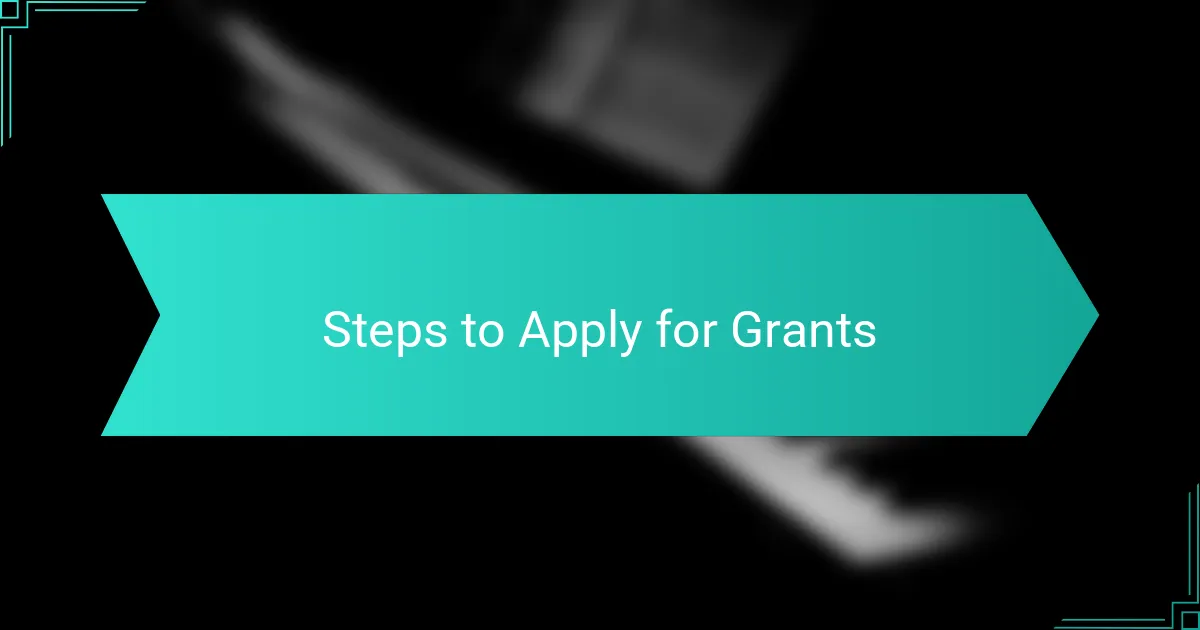
Steps to Apply for Grants
Applying for grants through the ASCAP Foundation can be an exciting yet daunting journey. From my experience, the first step is to thoroughly research the available grants. Understanding the specific criteria and requirements before diving into the application is crucial. I remember spending hours comparing different opportunities, which helped me narrow down the options that truly aligned with my artistic goals.
Next, gather all required materials, including your musical samples and project proposals. I found that having clear and concise descriptions greatly improved my chances. It’s like presenting your best self; you want to showcase not just your talent, but your vision too. Lastly, don’t hesitate to reach out for support. Connecting with fellow artists who’ve navigated the process can provide valuable insights and encouragement.
| Step | Description |
|---|---|
| Research Grants | Review options and align with your goals. |
| Gather Materials | Compile music samples and project details. |
| Seek Support | Connect with peers for insights and encouragement. |
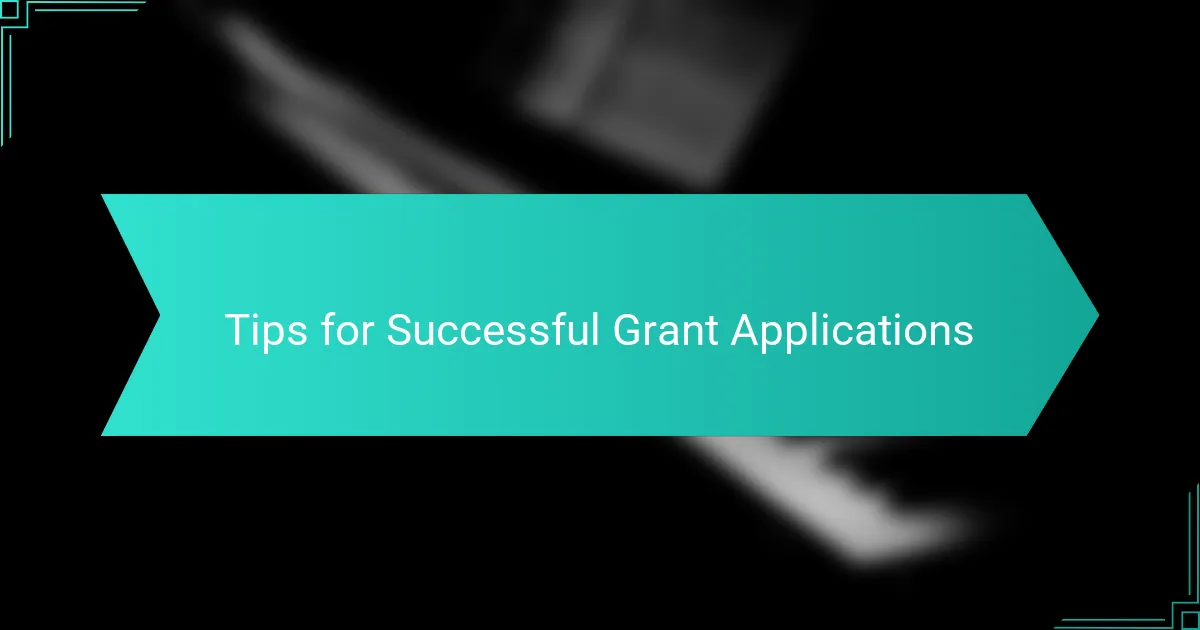
Tips for Successful Grant Applications
Navigating the world of grant applications can feel overwhelming, but there are some key tips that I found incredibly helpful during my own experiences with the ASCAP Foundation. For me, clarity in articulating my artistic vision was essential; I made sure to communicate not just the project I was working on, but also the passion and purpose behind it. This connection often resonates deeply with reviewers, making your application stand out.
Here are some practical tips that guided me through my successful grant applications:
- Tailor Each Application: Customize your proposal for each grant, reflecting its specific goals and priorities.
- Showcase Your Impact: Clearly explain how your project will positively influence the community or the music landscape.
- Be Concise Yet Comprehensive: Stick to the word limits while ensuring all crucial details are included; I often took the time to edit ruthlessly.
- Include Testimonials: Whenever possible, I included feedback from collaborators or audiences to demonstrate the value of my work.
- Use a Budget Sheet: A well-structured budget can show that you understand the financial aspects of your project, reinforcing your professionalism.
By applying these tips, I found that my applications gained strength and clarity, making it easier to convey my artistic journey and aspirations.
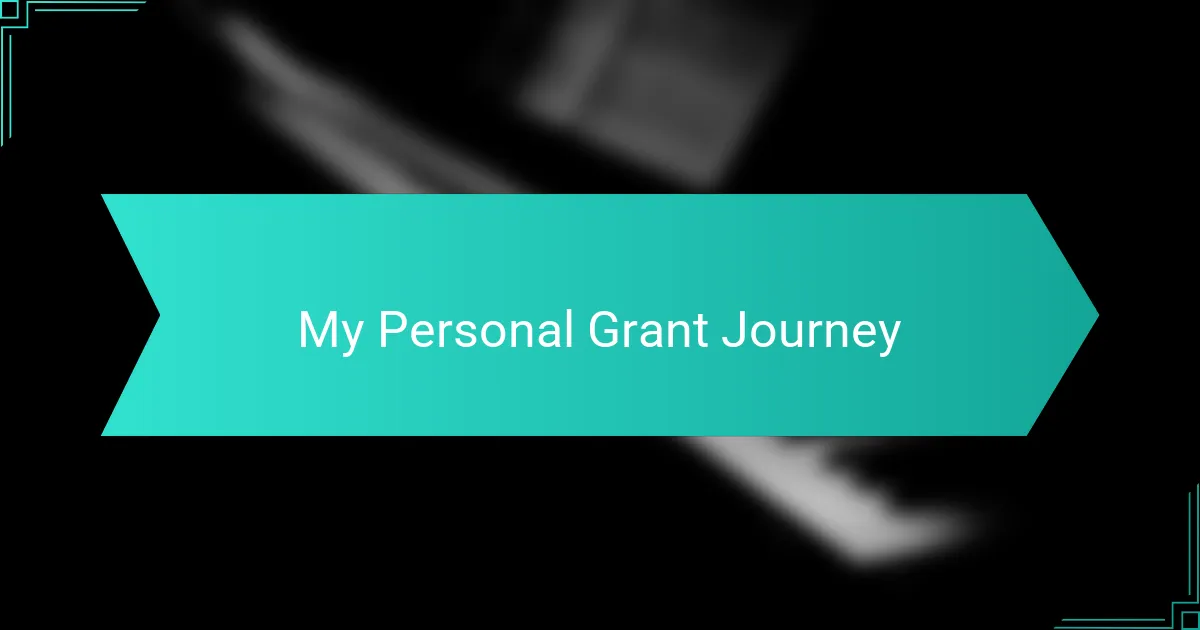
My Personal Grant Journey
I still remember the day I submitted my first grant application through the ASCAP Foundation. It felt nerve-wracking yet exhilarating, like stepping onto the stage for the first time. I poured my heart into that proposal, laying out not just my project but my entire vision, and I skeptically awaited the outcome. Was it too ambitious? Would they connect with my story?
As I navigated the process, I quickly learned that each rejection came with its lessons. I’ll never forget the feedback I received from one grant application. Rather than letting it discourage me, I used it as a stepping stone. I recognized that refinement was key, and with each submission, I became more adept at articulating my artistic voice. Have you ever felt the sting of rejection, only to find it fueling your determination?
Building connections within the community proved invaluable too. I discovered that casually discussing my projects with fellow musicians led to unexpected advice that shaped my applications. One conversation sparked new ideas, ultimately leading me to approach my next grant with renewed clarity and passion. It makes me wonder—how many opportunities lie just a discussion away?
